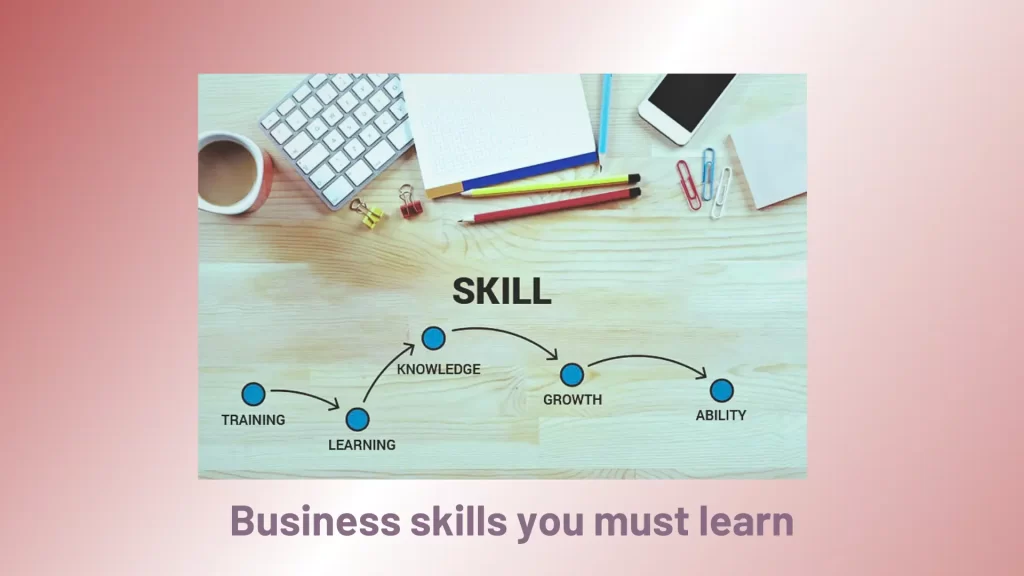Business skills is essential for every business owners. While many small business entrepreneurs are filled with enthusiasm, they frequently remains in lack with basic business skills. According to data from the U.S. Bureau of Labor Statistics, about half of new enterprises fail during the first five years, and approximately 65 percent fail within the first ten years. To avoid becoming one of those statistics, you must first recognize what talents you currently have and which you must develop or outsource to others.

While technical abilities are easy to learn via study and instruction, there is no actual tangible technique to teach human skills. Business skills are a form of personal talent that pertains to your work ethic and your ability to collaborate with others. They are acquired through time, maturity, and experience. Because they are so difficult to acquire, these abilities are highly prized by companies and may provide you with a competitive advantage.
All Personal skills in business will need for developing a brand new business but all business skills will not need to use in personal purpose. It varies man to man how they actually want to use business skills in their professional life.
Importance of Business skills in professional life for every employee
Business skills are significant since they are a necessary component of creating, operating, and managing a profitable business. If you operate a business, these abilities will allow you to fulfill the demands of both your customers and your staff.
So, What Exactly Are Business Skills?
Workplace success isn’t necessarily determined by how hard you work or how brilliant you are. Important commercial abilities such as communication, negotiation, marketing, and management are true success indicators. They play an important role in advancing one’s career and achieving workplace standards. Essential business skills have a favorable influence on your performance and productivity, whether you are a business owner or an employee.
In a word, business skills enable employees to comprehend both internal and external aspects that affect an organization’s growth and profitability. They aid in the achievement of corporate objectives that contribute to performance. While knowing company requirements and expectations is extremely crucial for entrepreneurs, leaders, and managers, any professional may benefit from it.
Why Are Business Skills Necessary?
Professionals are expected to go above and beyond their job definitions in today’s society. Employee training and development are encouraged in the majority of companies since it helps both the person and the business at large. Organizations may retain employees for extended periods of time by promoting employee engagement and job satisfaction via ongoing learning and skill development.
Important business skills enable professionals to build other parts of their capabilities, such as behavioral, social, and cognitive abilities. The capacity to effectively communicate, negotiate challenging situations, and demonstrate empathy, resilience, and excellent character are all very desirable skills. A solid foundation leads to self-confidence, which opens the door to a variety of employment choices.
Strong business skills will provide you 5 strong abilities:
- Employers are paying more attention.
- The ability to move into a new field for any new concept.
- More accountability at work.
- Opportunities for Professional Advancement (Promotions).
- Workplace Culture that is Positive with co-workers.
For example, it is vital for company leaders to ensure that every employee of their companies have abilities such as critical thinking, time management, and effective communication in order to guarantee that everyday tasks operate effectively and that corporate goals are met.
Two of the most significant talents necessary for corporate management are critical thinking and problem solving. In every corporate situation, regardless of your position on the organizational chart, you will confront difficult issues that will need critical analysis and decision-making.
This matters worse for some people that a lot of companies disregard soft skills, which have been shown in several studies to increase overall corporate performance.
One thing is certain, The correct business skills provide firms a strategic edge while also allowing workers to advance in their professions.
In this post you will learn the most important skills that are required (anything other than technical talents) you will need to develop to thrive in business.
The business skills you must learn

To be a successful entrepreneur and leader, you must have a diverse set of abilities. You must successfully delegate, communicate effectively, negotiate and plan strategically, lead and grow teams, think analytically, market and sell effectively, and manage funds, cash flow, and time. The following business abilities can assist you in achieving your professional objectives:
Leadership: The capacity of an individual or a group of individuals to influence and guide followers or members of an organization, community, or team is referred to as leadership. Leadership is frequently associated with a person’s mentality, seniority, or position in a hierarchy. It is the way to get moving of a team in achieving right goals or objects.
Motivation: Motivation is highly important to act others more skillfully and It represents something unique in each of us and enables us to get valuable benefits such as greater performance, improved wellness, personal growth, or a sense of purpose. The act of motivating involves changing our thoughts, feelings, or behaviors.
Influence: Influence helps to gain others thoughts, emotion, abilities and controlling more strategic opinions.
Strategy planning: Strategic planning is the process through which an organization’s executives outline their vision for the future and determine the aims and objectives of their company. For the organization to achieve its stated vision, it is necessary to determine how those objectives should be achieved.
Communication skills: Communication skills may take a lifetime to master—if anybody can claim to have learned them at all. To improve your communication skills and ensure that information is conveyed and received effectively, you can do numerous simple things. You need communication skills to act as of transforming information to one place to another.
Leadership skills: Leadership is the art of influencing and directing people in order to define and achieve common goals. It is one of the most essential business talents. Every great organization is built on a solid foundation of effective collaboration. As a leader, you must be able to motivate and encourage staff to be their most efficient and productive selves. Recognizing their abilities might assist you in utilizing them to the benefit of the firm.
Decision Making: Decision-making abilities are soft talents that may be used to help address any challenge in a business. Making smart judgments is critical to company success, whether an employee has to pick the ideal typeface for a brand logo or what growth marketing approach to adopt. Decision-making abilities encompass all of the abilities required to make an educated, reasoned decision. At work, someone with strong decision-making abilities may analyze all of the data, grasp the company’s present and desired states, and pick the best course of action.
Planning and Scheduling: The planning process is largely concerned with determining the necessary policies and processes in order to fulfill the project’s objectives. Scheduling involves creating an operational schedule based on project action plans for scope, cost, and quality.
Supervision skills: The act or function of supervising something or someone is known as supervision. It is the process of directing, instructing, and correcting someone. A “supervisor” is someone who undertakes supervision, however they may not usually have the formal title of supervisor. The “supervisee” is someone who receives supervision.
Performance management: Performance management is the process of developing a person to execute their work to the best of their abilities on a regular, systematic, and objective basis. As a result, performance appraisal is a component of performance management.
How to improve a business skills easily?
Business abilities may always be enhanced. Depending on your circumstances, you may discover that you require more development in some areas than others.
If you wish to develop your business abilities, you should:
Look for a mentor: A mentor, particularly one who is well-known, may show you how to develop your talents. They may provide comments and set an example for you to follow. They also give a forum for you to express questions and seek guidance.
Take note of what others are doing: Observing others is an excellent approach to develop your commercial abilities. You can try to replicate their conduct or discover something comparable if they’re skilled at what they do. Observing someone with weak business abilities may also be beneficial since they can teach you what not to do!
Learn from people and their activities: There are several tools available to educate you how to develop your business abilities, whether via personal research and reading or through completing a course.
Maintain a developing mentality: The first step toward improvement is changing your mentality. A growth mindset is advantageous because it helps you to view problems as opportunities and keeps you open to the possibility of change.
Does Training or certification business skills course help you?
In a more formal role, you can complete additional training and certification programs to improve your employment abilities and credentials. You may obtain certification in a variety of leadership philosophies, public speaking, and even high-speed typing. Consider less apparent areas that may push you to think differently, such as diversity, peer mediation, and sustainable design. Getting out of your comfort zone is also an excellent approach to distinguish yourself from your colleagues and contribute something fresh to the table.
Last words
These abilities, which affect how you work and how well you handle responsibilities, might be equally as important as those gained in a classroom context. Because they cannot be taught, you must take concrete efforts to acquire these skills and increase your total worth as an employee.
Identifying your weaknesses, reading business and self-help books, watching TedTalks, and attending business seminars are just a few strategies to begin developing your business abilities now. You have a lot of opportunities at your disposal, so make use of them.
It will take time to master these talents, but any employer worth their salt will be able to identify and reward your accomplishments.



